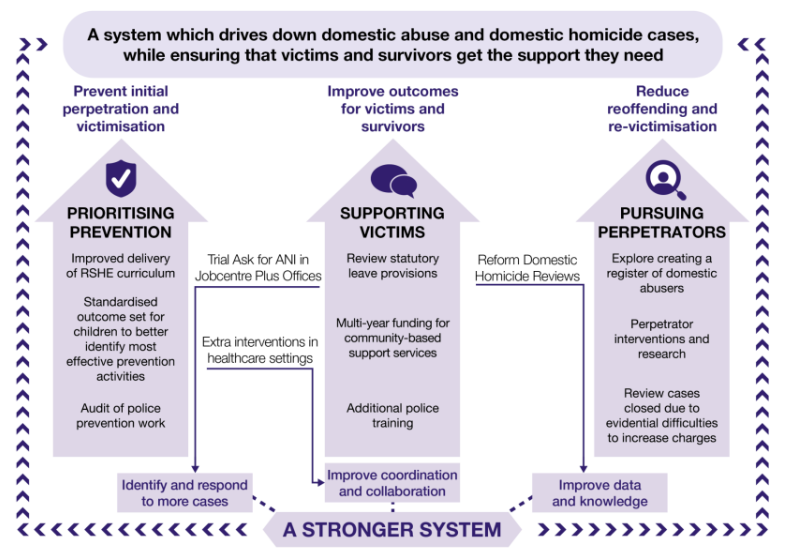
From prioritising prevention to pursuing perpetrators, Bristol Women’s Voice volunteer Chloe Hughes summarises the key points from the government’s new Tackling Domestic Abuse Plan.
An estimated 2.3 million people in England and Wales experience domestic abuse in any one year. The fact that over-two thirds (1.6 million) of victims are women re-enforces the gendered nature of domestic abuse.
With the coronavirus pandemic shining a spotlight on the prevalence of domestic abuse in the UK, the government has been taking steps to tackle domestic abuse, including increased funding, the passing of the Domestic Abuse Act in 2021, and now this new plan which will see it invest £230 million to deliver many of the act’s provisions to bring about a response from all parts of society.
Problems identified
Four major problems were identified that this plan seeks to address:
- The stubbornly high prevalence of domestic abuse.
- The significant loss of life caused by domestic abuse.
- The negative health, emotional, economic and social impact victims and survivors face during and following domestic abuse.
- Problems within the current system that need improving, which include: identifying more domestic abuse cases, greater collaboration and coordination between and within organisations and improving knowledge about domestic abuse through better data.
This Tackling Domestic Abuse Plan, therefore, focuses on four main areas that interact together:
- Prioritising prevention
- Supporting victims
- Pursuing perpetrators
- Building a stronger system

Prioritising prevention
Objective: “Reduce the amount of domestic abuse, domestic homicide and suicides linked to domestic abuse by stopping people from becoming perpetrators and victims to begin with.”
Key commitments:
- The Department of Education will provide support to teachers that deliver the recently updated Relationships, Sex and Health Education (RSHE) curriculum, to ensure that children from a young age know about healthy relationships and teachers can challenge poor attitudes towards relationship behaviours.
- The Home Office is supporting the development of methods to measure the effectiveness of different interventions which support children experiencing domestic abuse, including key outcomes such as future relationships, wellbeing, perceptions of safety and freedom.
- The Home Office will work with the National Police Chiefs Council to identify and audit police forces which record the highest rates of domestic homicide and serious domestic abuse crimes.
Supporting Victims
Objective: “Help all victims and survivors who have escaped from domestic abuse feel that they can get back to life as normal, with support for their health, emotional, economic and social needs.”
Key commitments:
- The Department for Business, Energy and Industrial Strategy will review the current statutory leave provision for employees and consider if this does enough to support victims and survivors who are trying to escape domestic abuse.
- The Ministry of Justice will ringfence £47.1 million over three years for community-based services supporting victims and survivors of domestic abuse and sexual violence and provide £81 million for Independent Domestic Violence Advisors and Independent Sexual Violence Advisors.
- The Home Office will provide up to £3.3 million to fund the rollout of Domestic Abuse Matters training to police forces that have not yet delivered it or do not have their own training.
- The Ministry of Justice will be looking into introducing national commissioning standards across all victim support services and Department for Levelling Up, Housing and Communities (DLUHC) Quality Standards for support in safe accommodation.
Pursuing perpetrators
Objective: “Reduce the amount of people who are repeat offenders and make sure that those who commit this crime feel the full force of the law.”
Key commitments:
- To better understand and address the falling number of charges, the Home Office will accept recommendations made in reports by Her Majesty’s Inspectorate of Constabulary and Fire & Rescue Services (HMICFRS) to conduct a review of data on domestic abuse cases closed due to lack of evidence or when the victim does not support police action.
- The Government is actively exploring creating a register of domestic abuse offenders. The Ministry of Justice will also increase the tagging of people leaving custody, including around 3,500 who are at risk of perpetrating domestic abuse.
- The Home Office will allocate £6.7 million over the next three years to refine and pilot the rollout of risk assessment tools such as the Recency, Frequency, Gravity and Victimisation model.
- To get perpetrators to change their behaviour and reduce reoffending, the Home Office will invest £75 million over three years into tackling domestic abusers, including funding for perpetrator interventions, evaluation and further research.
A stronger system
Objective: “Improve the systems and processes that underpin the response to domestic abuse across society.”
Key commitments:
- The Home Office will work with the Department for Work and Pensions to trial and consider a national rollout of the Ask for ANI codeword scheme across Jobcentre Plus offices.
- The Home Office will invest up to £7.5 million over three years to implement structures within healthcare settings to help doctors, nurses, and midwives to better identify and refer domestic abuse cases.
- The Department of Health and Social Care’s Women’s Health Strategy will seek to address some of the barriers that victims and survivors of domestic abuse face when interacting with health services.
- The Home Office will also reform the Domestic Homicide Review (DHR) process to improve our data on domestic homicides and suicides following domestic abuse.

